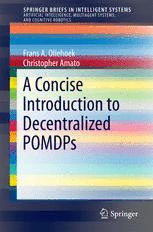Table Of ContentSPRINGER BRIEFS IN INTELLIGENT SYSTEMS
ARTIFICIAL INTELLIGENCE, MULTIAGENT SYSTEMS,
AND COGNITIVE ROBOTICS
Frans A. Oliehoek
Christopher Amato
A Concise
Introduction to
Decentralized
POMDPs
123
SpringerBriefs in Intelligent Systems
fi
Arti cial Intelligence, Multiagent Systems,
and Cognitive Robotics
Series editors
Gerhard Weiss, Maastricht University, Maastricht, The Netherlands
Karl Tuyls, University of Liverpool, Liverpool, UK
Editorial Board
Felix Brandt, Technische Universität München, Munich, Germany
Wolfram Burgard, Albert-Ludwigs-Universität Freiburg, Freiburg, Germany
Marco Dorigo, Université libre de Bruxelles, Brussels, Belgium
Peter Flach, University of Bristol, Bristol, UK
Brian Gerkey, Open Source Robotics Foundation, Bristol, UK
Nicholas R. Jennings, Southampton University, Southampton, UK
Michael Luck, King’s College London, London, UK
Simon Parsons, City University of New York, New York, US
Henri Prade, IRIT, Toulouse, France
Jeffrey S. Rosenschein, Hebrew University of Jerusalem, Jerusalem, Israel
Francesca Rossi, University of Padova, Padua, Italy
Carles Sierra, IIIA-CSIC Cerdanyola, Barcelona, Spain
Milind Tambe, USC, Los Angeles, US
Makoto Yokoo, Kyushu University, Fukuoka, Japan
This series covers the entire research and application spectrum of intelligent
systems, including artificial intelligence, multiagent systems, and cognitive
robotics. Typical texts for publication in the series include, but are not limited to,
state-of-the-art reviews, tutorials, summaries, introductions, surveys, and in-depth
case and application studies of established or emerging fields and topics in the
realm of computational intelligent systems. Essays exploring philosophical and
societal issues raised by intelligent systems are also very welcome.
More information about this series at http://www.springer.com/series/11845
Frans A. Oliehoek Christopher Amato
(cid:129)
A Concise Introduction
to Decentralized POMDPs
123
FransA.Oliehoek Christopher Amato
SchoolofElectricalEngineering,Electronics ComputerScienceandArtificialIntelligence
andComputer Science Laboratory
University of Liverpool MIT
Liverpool Cambridge, MA
UK USA
ISSN 2196-548X ISSN 2196-5498 (electronic)
SpringerBriefs inIntelligent Systems
ISBN978-3-319-28927-4 ISBN978-3-319-28929-8 (eBook)
DOI 10.1007/978-3-319-28929-8
LibraryofCongressControlNumber:2016941071
©TheAuthor(s)2016
Thisworkissubjecttocopyright.AllrightsarereservedbythePublisher,whetherthewholeorpart
of the material is concerned, specifically the rights of translation, reprinting, reuse of illustrations,
recitation, broadcasting, reproduction on microfilms or in any other physical way, and transmission
orinformationstorageandretrieval,electronicadaptation,computersoftware,orbysimilarordissimilar
methodologynowknownorhereafterdeveloped.
The use of general descriptive names, registered names, trademarks, service marks, etc. in this
publicationdoesnotimply,evenintheabsenceofaspecificstatement,thatsuchnamesareexemptfrom
therelevantprotectivelawsandregulationsandthereforefreeforgeneraluse.
The publisher, the authors and the editors are safe to assume that the advice and information in this
book are believed to be true and accurate at the date of publication. Neither the publisher nor the
authorsortheeditorsgiveawarranty,expressorimplied,withrespecttothematerialcontainedhereinor
foranyerrorsoromissionsthatmayhavebeenmade.
Printedonacid-freepaper
ThisSpringerimprintispublishedbySpringerNature
TheregisteredcompanyisSpringerInternationalPublishingAGSwitzerland
Dedicatedtofuturegenerationsofintelligent
decisionmakers.
Preface
Thisbookpresentsanoverviewofformaldecisionmakingmethodsfordecentral-
ized cooperative systems. It is aimed at graduate students and researchers in the
fieldsofartificialintelligenceandrelatedfieldsthatdealwithdecisionmaking,such
asoperationsresearchandcontroltheory.Whilewehavetriedtomakethebookrel-
ativelyself-contained,wedoassumesomeamountofbackgroundknowledge.
Inparticular,weassumethatthereaderisfamiliarwiththeconceptofanagentas
wellassearchtechniques(likedepth-firstsearch,A*,etc.),bothofwhicharestan-
dardinthefieldofartificialintelligence[RussellandNorvig,2009].Additionally,
we assume that the reader has a basic background in probability theory. Although
wegiveaveryconcisebackgroundinrelevantsingle-agentmodels(i.e.,the‘MDP’
and ‘POMDP’ frameworks), a more thorough understanding of those frameworks
would benefit the reader. A good first introduction to these concepts can be found
inthetextbookbyRussellandNorvig,withadditionaldetailsintextsbySuttonand
Barto[1998],Kaelblingetal.[1998],Spaan[2012]andKochenderferetal.[2015].
We alsoassume thatthe readerhas abasic background ingame theoryand game-
theoreticnotationslikeNashequilibriumandParetoefficiency.Eventhoughthese
conceptsarenotcentraltoourexposition,wedoplacetheDec-POMDPmodelin
themoregeneralcontexttheyoffer.Foranexplanationoftheseconcepts,thereader
could refer to any introduction on game theory, such as those by Binmore [1992],
OsborneandRubinstein[1994]andLeyton-BrownandShoham[2008].
This book heavily builds upon earlier texts by the authors. In particular, many
partswerebasedontheauthors’previoustheses,bookchaptersandsurveyarticles
[Oliehoek, 2010, 2012, Amato, 2010, 2015, Amato et al., 2013]. This also means
that,eventhoughwehavetriedtogivearelativelycompleteoverviewofthework
inthefield,thetextinsomecasesisbiasedtowardsexamplesandmethodsthathave
been considered by the authors. For the description of further topics in Chapter 8,
we have selected those that we consider important and promising for future work.
Clearly, there is a necessarily large overlap between these topics and the authors’
recentworkinthefield.
vii
Acknowledgments
Writing a book is not a standalone activity; it builds upon all the insights devel-
opedintheinteractionswithpeers,reviewersandcoathors.Assuch,wearegrateful
fortheinteractionwehavehadwiththeentireresearchfield.Wespecificallywant
to thank the attendees and organizers of the workshops on multiagent sequential
decisionmaking(MSDM)whichhaveprovidedauniqueplatformforexchangeof
thoughtsondecisionmakingunderuncertainty.
Furthermore, we would like to thank João Messias, Matthijs Spaan, Shimon
Whiteson,andStefanWitwickifortheirfeedbackonsectionsofthemanuscript.
Finally,wearegratefultoourformersupervisors,inparticularNikosVlassisand
ShlomoZilberstein,whoenabledandstimulatedustogodownthepathofresearch
ondecentralizeddecisionmaking.
ix
Contents
1 MultiagentSystemsUnderUncertainty .......................... 1
1.1 MotivatingExamples ....................................... 2
1.2 MultiagentSystems......................................... 4
1.3 Uncertainty................................................ 6
1.4 Applications .............................................. 7
2 TheDecentralizedPOMDPFramework .......................... 11
2.1 Single-AgentDecisionFrameworks ........................... 11
2.1.1 MDPs.............................................. 12
2.1.2 POMDPs ........................................... 13
2.2 MultiagentDecisionMaking:DecentralizedPOMDPs............ 14
2.3 ExampleDomains.......................................... 17
2.3.1 Dec-Tiger .......................................... 17
2.3.2 MultirobotCoordination:RecyclingandBox-Pushing ..... 19
2.3.3 NetworkProtocolOptimization ........................ 20
2.3.4 EfficientSensorNetworks............................. 20
2.4 SpecialCases,GeneralizationsandRelatedModels ............. 21
2.4.1 ObservabilityandDec-MDPs .......................... 21
2.4.2 FactoredModels..................................... 22
2.4.3 CentralizedModels:MMDPsandMPOMDPs............ 24
2.4.4 MultiagentDecisionProblems ......................... 25
2.4.5 PartiallyObservableStochasticGames .................. 30
2.4.6 InteractivePOMDPs ................................. 30
3 Finite-HorizonDec-POMDPs ................................... 33
3.1 OptimalityCriteria ......................................... 33
3.2 PolicyRepresentations:HistoriesandPolicies .................. 34
3.2.1 Histories ........................................... 34
3.2.2 Policies ............................................ 35
3.3 MultiagentBeliefs.......................................... 37
3.4 ValueFunctionsforJointPolicies ............................. 37
xi
xii Contents
3.5 Complexity................................................ 39
4 ExactFinite-HorizonPlanningMethods .......................... 41
4.1 BackwardsApproach:DynamicProgramming .................. 41
4.1.1 GrowingPoliciesfromSubtreePolicies ................. 41
4.1.2 DynamicProgrammingforDec-POMDPs ............... 44
4.2 ForwardApproach:HeuristicSearch .......................... 46
4.2.1 TemporalStructureinPolicies:DecisionRules ........... 46
4.2.2 MultiagentA* ...................................... 47
4.3 ConvertingtoaNon-observableMDP ......................... 48
4.3.1 ThePlan-TimeMDPandOptimalValueFunction......... 49
4.3.2 Plan-TimeSufficientStatistics ......................... 49
4.3.3 AnNOMDPFormulation ............................. 51
4.4 OtherFinite-HorizonMethods................................ 52
4.4.1 Point-BasedDP ..................................... 52
4.4.2 Optimization ....................................... 52
5 ApproximateandHeuristicFinite-HorizonPlanningMethods ...... 55
5.1 ApproximationMethods..................................... 56
5.1.1 BoundedDynamicProgramming ....................... 56
5.1.2 EarlyStoppingofHeuristicSearch ..................... 57
5.1.3 ApplicationofPOMDPApproximationAlgorithms ....... 57
5.2 HeuristicMethods.......................................... 58
5.2.1 AlternatingMaximization ............................. 58
5.2.2 Memory-BoundedDynamicProgramming .............. 59
5.2.3 ApproximateHeuristic-SearchMethods ................. 61
5.2.4 EvolutionaryMethodsandCross-EntropyOptimization .... 64
6 Infinite-HorizonDec-POMDPs .................................. 69
6.1 OptimalityCriteria ......................................... 69
6.1.1 DiscountedCumulativeReward ........................ 69
6.1.2 AverageReward ..................................... 70
6.2 PolicyRepresentation....................................... 70
6.2.1 Finite-StateControllers:MooreandMealy............... 71
6.2.2 AnExampleSolutionforDEC-TIGER .................. 73
6.2.3 Randomization ...................................... 74
6.2.4 CorrelationDevices .................................. 74
6.3 ValueFunctionsforJointPolicies ............................. 75
6.4 Undecidability,AlternativeGoalsandTheirComplexity ......... 76
7 Infinite-HorizonPlanningMethods:DiscountedCumulativeReward 79
7.1 PolicyIteration ............................................ 79
7.2 OptimizingFixed-SizeControllers ............................ 81
7.2.1 Best-FirstSearch .................................... 82
7.2.2 BoundedPolicyIteration ............................. 83
7.2.3 NonlinearProgramming .............................. 85

